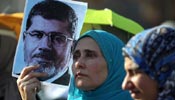International opinion has strongly condemned the crackdown by Egyptian security forces on Wednesday that resulted in large-scale fatalities and severe injuries.
This condemnation has become part of the chaos in Egypt, but it is doubtful as to whether it will have any effect.
It's difficult to pinpoint who is responsible for this. The US has taken the initiative in voicing condemnation, thus distancing itself from this "massacre." Egypt's Interim Vice President Mohamed ElBaradei, who has relentlessly attempted to oust the Muslim Brotherhood over the past few months and who has a close relationship with the security forces, resigned Wednesday, thus separating himself from the "violence." Objectively speaking, it is not fair to blame the current uproar on a single person or force.
The US hasn't announced real sanctions on the Egyptian military. It only canceled joint military exercises with Egypt. Such "sanctions" can hardly be compared to those on Libya or Syria. European countries also adopted the same approach. The Egyptian military is likely to escape the calamity.
The hands of the Egyptian security forces are soaked with blood of Muslim Brotherhood and its supporters. But the latter is deemed by the West as disruptive to the Middle East. It is hard to define the successes or crimes of the military side. It is also the main reason why there still seems to be no way out of the bloodshed.
The Muslim Brotherhood, which holds an anti-Western stance, enjoys wide grass-roots support in Egypt and the Middle East. Democracy has been transported from the West, however, democracy often elects forces such as Muslim Brotherhood, making the democratic process stuck in a dilemma in this area. The dilemma has tortured Algeria and Palestine. Now it is Egypt's turn.
The bloody confrontation will likely be seen as labor pains for Egypt as it heads toward democracy. Egypt has been forced to take the current political path, and pain is inevitable. It cannot go back to the Mubarak era. People might not want to go back either. They can only struggle ahead amid uncertainty.
Underdeveloped countries have few choices in choosing political transformation with all the source of reform imagination coming from the West's political dogma. The guidance from the West to the third world nations is of the same pattern: encouraging elections and disregarding the differences in local political cultures.
Western politicians and elites have no preventative measures designed for those countries which might slide into chaos. In today's developing countries, it is hard to gain an institutional authority within one step. The loss of order is the biggest risk in the democratization process.
Egyptians must engage in deep reflection. They can only rely on themselves as nobody else will be truly responsible for their fate. If the turbulence has deprived them of their ability to think, then they can only have their fate decided by the internal conflict and selfish external world.
 Helicopters, tanks seen during China-Russia joint drill
Helicopters, tanks seen during China-Russia joint drill Conjoined twins separated in groundbreaking surgery
Conjoined twins separated in groundbreaking surgery Summer photos of Zhang Xinyi, how graceful
Summer photos of Zhang Xinyi, how graceful  Pakistan celebrates Independence Day
Pakistan celebrates Independence Day Beijing Int'l Gifts, Premium & Houseware Exhibition opens
Beijing Int'l Gifts, Premium & Houseware Exhibition opens Kung Fu soccer team trains at Songshan Shaolin training base
Kung Fu soccer team trains at Songshan Shaolin training base  Air Force's combat group conducts flight training in joint drills
Air Force's combat group conducts flight training in joint drills Protests held in Gaza, Jordan to support Egyptian people
Protests held in Gaza, Jordan to support Egyptian people Various sun protective outfits
Various sun protective outfits Jaguar Land Rover to recall 11,852 cars
Jaguar Land Rover to recall 11,852 cars In sports arena, you are my greatest rival!
In sports arena, you are my greatest rival! Top 10 fatal vipers on earth
Top 10 fatal vipers on earth Day|Week|Month